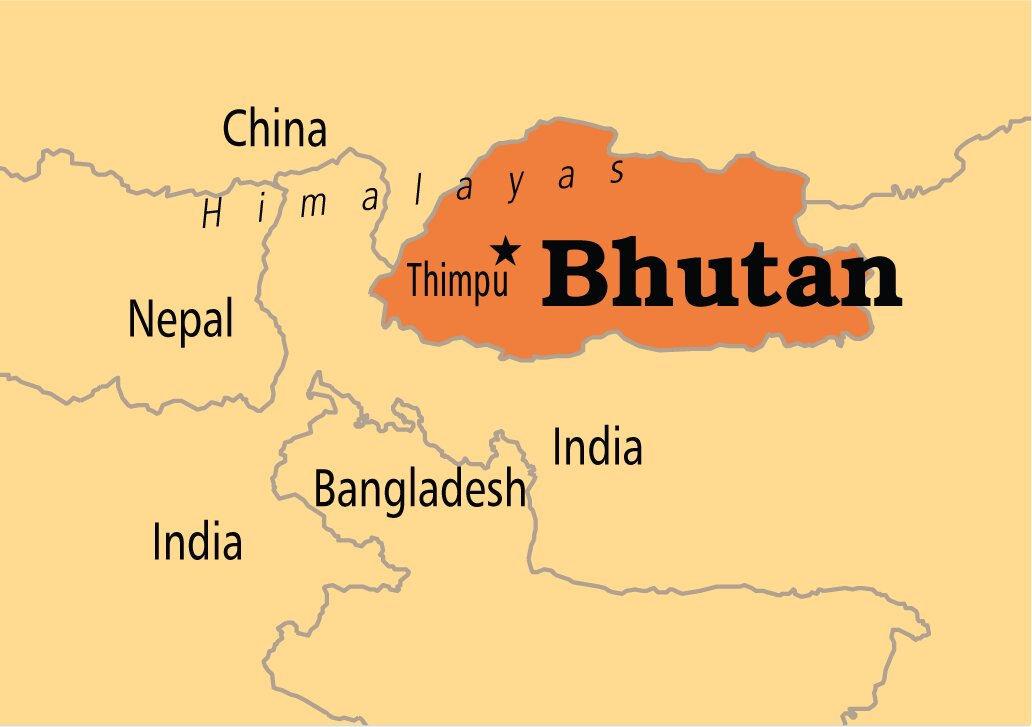Bhutan’s King Visits India | 06 Apr 2023
For Prelims: Chhukha hydro-electric project, Integrated Check Post along the India-Bhutan border, STEM-based initiatives, Bharat Interface for Money.
For Mains: India-Bhutan Relations.
Why in News?
Bhutan’s King visited India and met the Indian Prime Minister, where both leaders discussed bilateral cooperation and issues of national and regional interests.
What are the Key Highlights of the Meeting?
- Bhutan's Development Plans:
- The focus was primarily on Bhutanese's Transformation Initiatives and Reforms Process, as well as India's support for Bhutan's development plans, including the 13th Five Year Plan that starts from next year 2024.
- Bhutan is set to graduate from the list of Least Developed Countries in 2023 and aims to turn into a developed country with a per-capita income of USD 12,000 in the next ten years.
- Credit Facility and Financial Support:
- India has agreed to extend Bhutan a third additional standby credit facility and has also discussed financial support for reforms and institutional capacity building, infrastructure and connectivity projects, energy cooperation including hydropower and solar energy projects, as well as space cooperation, including the recent launch of the India-Bhutan satellite.
- Power Tariff for Hydro-Electric Project:
- The Indian government has agreed to a long-pending demand from Bhutan to increase the power tariffs for the Chhukha hydro-electric project, which began operations with India's help in 1986.
- Furthermore, India has agreed to discuss buying power from the Basochhu hydel project that was built with Austrian support in 2008.
- Sankosh Hydel Project:
- The two sides will also try to expedite negotiations on the reservoir-based 2,500 MW Sankosh hydel project, which has been stuck for decades due to environmental and cost concerns.
- Integrated Check Post:
- India is also examining the possibility of setting up the first Integrated Check Post along the India-Bhutan border at Jaigaon and expediting the proposed Kokrajhar-Gelephu rail link project.
- Rail and Air Link:
- Bhutan is constructing its second international airport at Gelephu, near the border with India, and the rail link project would help build the southern Bhutanese city into a hub for attracting international investment.
- Digital Infrastructure:
- Cooperation in newer areas beyond the traditional realms of cooperation such as new STEM-based initiatives, establishment of digital infrastructure such as the Third International Internet Gateway, integration of Bhutan’s DrukRen with India’s National Knowledge Network – a key cooperation in the domain of e-Learning, E-library project complementing Bhutan’s efforts at digital transformation, e-learning, were also discussed.
- Financial Cooperation:
- Under Financial Cooperation or Integration, the first phase of the RuPay project was launched, India’s Bharat Interface for Money (BHIM) was also launched in July 2021.
- The two sides will also review the implementation of the BHIM app in Bhutan.
How have been Indo-Bhutan Relationships?
- Indo-Bhutan Treaty of Peace and Friendship, 1949:
- The Treaty provides for, among other things, perpetual peace and friendship, free trade and commerce and equal justice to each other’s citizens.
- In 2007 the treaty was re-negotiated, and provisions were included to encourage Bhutan’s sovereignty, abolishing the need to take India’s guidance on foreign policy.
- Multilateral Partnership:
- Both of them share multilateral forums such as South Asian Association for Regional Cooperation (SAARC), BBIN (Bangladesh, Bhutan, India, and Nepal), BIMSTEC (Bay of Bengal Initiative for Multi Sectoral Technical and Economic Cooperation) etc.
- Hydropower Cooperation:
- This hydropower cooperation comes under the 2006 Agreement on Cooperation in Hydropower. Under a protocol to this agreement, India has agreed to assist Bhutan in the development of a minimum of 10,000 MW of hydropower and import of surplus electricity from the same by 2020.
- Four hydro-electric projects (HEPs)- Chhukha, Kurichu, Tala and Mangdechhu totaling 2136 MW are already operational in Bhutan and are supplying electricity to India.
- Two HEPs namely, Punatsangchhu-I, Punatsangchhu-II in Inter-Governmental mode are under various stages of implementation
- Trade:
- The trade between the two countries is governed by the India Bhutan Trade and Transit Agreement 1972 which was last renewed in November 2016.
- In November 2021, the Indian government formalised the opening of seven new trade routes for Bhutan's bilateral and transit trade with India.
- These new routes are expected to boost economic activity in the region and enhance connectivity between the two countries.
- In addition to this, new market access has been provided to allow formal export of 12 agri-products from Bhutan to India, which is expected to provide a major boost to the country's agriculture sector.
- Economic Assistance:
- India is Bhutan’s leading development partner. Since the launch of the First Five Year Plan of Bhutan in 1961, India has been extending financial support to Bhutan’s FYPs. India has allotted Rs 4500 crore to Bhutan’s 12th FYP (2018-23).
- Educational and Cultural Cooperation:
- A large number of college going Bhutanese students study in India. The Government of India provides a number of scholarships to Bhutanese students.
Way Forward
- The importance of environmental sustainability cannot be overstated in the context of Indo-Bhutan relations. Both India and Bhutan are blessed with abundant natural resources, and it is imperative that they work together to preserve and protect these resources for future generations.
- Therefore, it is crucial that India and Bhutan continue to prioritize environmental sustainability in their bilateral relations, and work towards achieving their shared goals of promoting sustainable development and protecting natural resources.

